语法复习题复合过去时
初级法语语法:复合过去分词
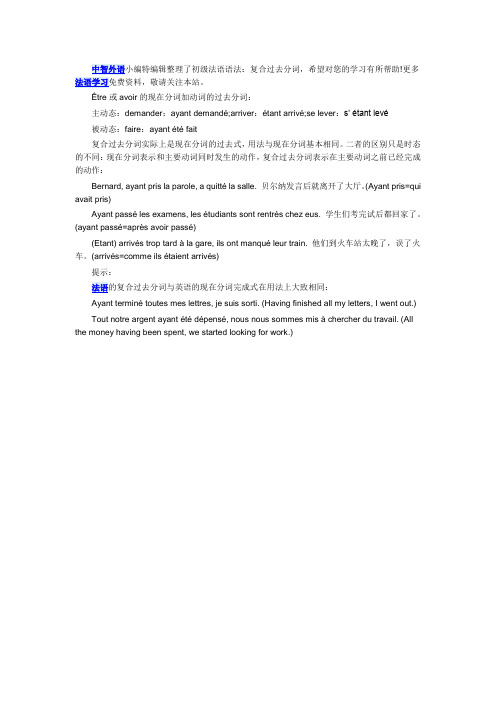
!更多Être或avoir的现在分词加动词的过去分词:主动态:demander:ayant demandé;arriver:étant arrivé;se lever:s’ étant levé被动态:faire:ayant été fait复合过去分词实际上是现在分词的过去式,用法与现在分词基本相同。
二者的区别只是时态的不同:现在分词表示和主要动词同时发生的动作,复合过去分词表示在主要动词之前已经完成的动作:Bernard, ayant pris la parole, a quitté la salle. 贝尔纳发言后就离开了大厅。
(Ayant pris=qui avait pris)Ayant passé les examens, les étudiants sont rentrés chez eus. 学生们考完试后都回家了。
(ayant passé=après avoir passé)(Etant) arrivés trop tard à la gare, ils ont manqué leur train. 他们到火车站太晚了,误了火车。
(arrivés=comme ils étaient arrivés)提示:Ayant terminé toutes mes lettres, je suis sorti. (Having finished all my letters, I went out.) Tout notre argent ayant été dépensé, nous nous sommes mis à chercher du travail. (All the money having been spent, we started looking for work.)。
高考英语复习语法时态专题讲解与练习1---with复合结构(解析版)
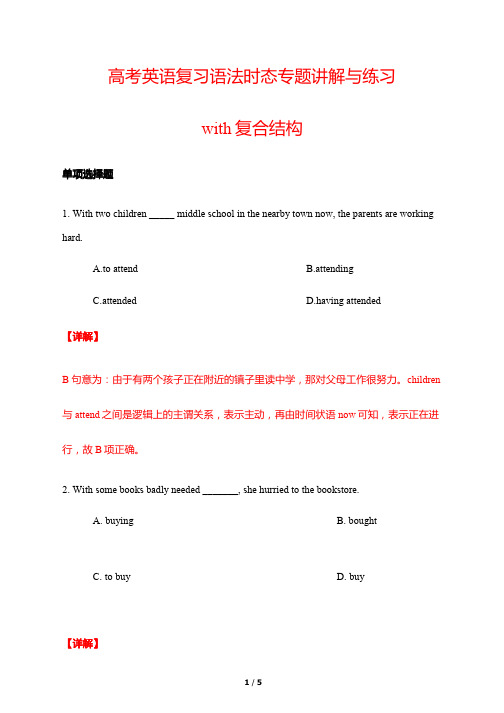
高考英语复习语法时态专题讲解与练习with复合结构单项选择题1. With two children _____ middle school in the nearby town now, the parents are working hard.A.to attendB.attendingC.attendedD.having attended【详解】B 句意为:由于有两个孩子正在附近的镇子里读中学,那对父母工作很努力。
children 与attend之间是逻辑上的主谓关系,表示主动,再由时间状语now可知,表示正在进行,故B项正确。
2. With some books badly needed _______, she hurried to the bookstore.A. buyingB. boughtC. to buyD. buy【详解】C 句意:有一些书要买,她急匆匆地去了书店。
在with复合结构中,不定式表将来。
故答案为C。
3. The old couple often take a walk after supper in the park with their pet dog them.A.to followB.followingC.followedD.follows 【详解】B句意:这老两口常常在晚饭后到公园里散步,他们的宠物狗则在后面跟着。
在with 复合结构中,their pet dog与follow是主谓关系,因此这里用现在分词作宾补。
4. The living room is clean and tidy, with a dining table already __________ for a meal to be cooked.A. laidB. layingC. to layD. being laid【详解】A lay与a dining table为动宾关系,再由already可知非谓语所表示动作已经完成。
单元语法 一般过去时和复合不定代词100题-英语八年级上册单元冲刺满分题型训练(人教版)
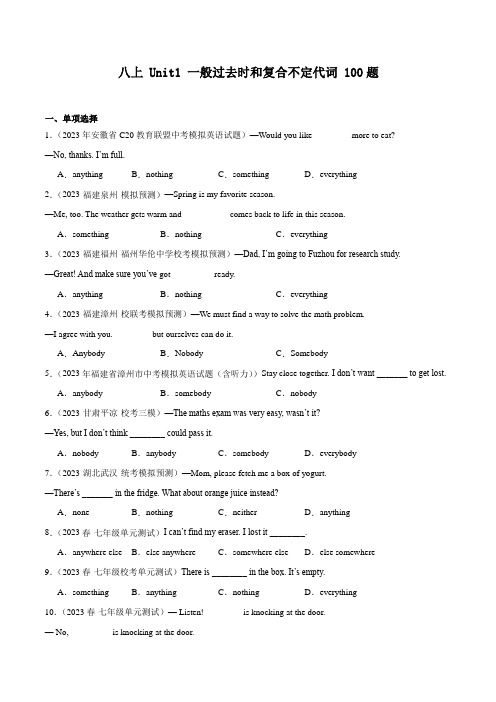
八上 Unit1 一般过去时和复合不定代词 100题一、单项选择1.(2023年安徽省C20教育联盟中考模拟英语试题)—Would you like ________ more to eat?—No, thanks. I’m full.A.anything B.nothing C.something D.everything2.(2023·福建泉州·模拟预测)—Spring is my favorite season.—Me, too. The weather gets warm and __________ comes back to life in this season.A.something B.nothing C.everything3.(2023·福建福州·福州华伦中学校考模拟预测)—Dad, I’m going to Fuzhou for research study.—Great! And make sure you’ve got _________ ready.A.anything B.nothing C.everything4.(2023·福建漳州·校联考模拟预测)—We must find a way to solve the math problem.—I agree with you. ________ but ourselves can do it.A.Anybody B.Nobody C.Somebody5.(2023年福建省漳州市中考模拟英语试题(含听力))Stay close together. I don’t want _______ to get lost.A.anybody B.somebody C.nobody6.(2023·甘肃平凉·校考三模)—The maths exam was very easy, wasn’t it?—Yes, but I don’t think ________ could pass it.A.nobody B.anybody C.somebody D.everybody7.(2023·湖北武汉·统考模拟预测)—Mom, please fetch me a box of yogurt.—There’s _______ in the fridge. What about orange juice instead?A.none B.nothing C.neither D.anything8.(2023春·七年级单元测试)I can’t find my eraser. I lost it ________.A.anywhere else B.else anywhere C.somewhere else D.else somewhere9.(2023春·七年级校考单元测试)There is ________ in the box. It’s empty.A.something B.anything C.nothing D.everything10.(2023春·七年级单元测试)— Listen! ________ is knocking at the door.— No, _________ is knocking at the door.A.Nobody; somebody B.Somebody; anybodyC.Somebody; nobody D.Anybody; somebody11.(2022秋·九年级单元测试)—Have you read today’s newspaper?.—Not yet. Is there______ ?A.anything important B.important anything C.something important12.(2023春·七年级单元测试)The shirt is a little expensive. Could you please show me ________ one?A.the others B.more C.others D.another13.(2023·湖南益阳·统考中考真题)—Did you buy ________ special for your father on Father’s Day? —Yes, I bought a pair of sports shoes for him.A.something B.anything C.nothing14.(2023春·江苏无锡·七年级统考期末)— Sandy looks worried these days. What happened to her?— Well, everyone has those days when ________ goes right.A.everything B.nothing C.something D.anything15.(2023春·七年级单元测试)I didn’t buy ________ because things in the shop are too expensive.A.something B.nothing C.anything D.everything16.(2022春·七年级单元测试)I have _______ to tell you.A.new something B.something newC.anything new D.new anything17.(2023春·山东滨州·七年级统考期末)—The store is not big but we can buy ________ in it. Let’s go and have a look!—But now we don’t need to buy ________.A.everything; anything B.everything; everythingC.anything; something D.anything; everything18.(2023春·河北承德·八年级统考期末)How poor the old man is! Let’s do ________ to raise money for him.A.nothing B.something C.everything D.anything19.(2023春·河北石家庄·七年级统考期末)We haven’t got ________ pencils. Let’s go and buy ________.A.some; any B.some; some C.any; some D.any; any20.(2023春·江苏南通·七年级统考期末)Shirley, think twice before you make the decision. ________ else can do it for you.A.Somebody B.Anybody C.Everybody D.Nobody21.(2023·江苏镇江·统考一模)After a busy day, ________ is better than enjoying dinner with all my family members.A.nothing B.anything C.something D.everything22.(2023·湖北十堰·统考一模)—Could you please open the window to let the fresh air in?—I’d love to. But there is ________ outside in the air.A.dirty anything B.something dirtyC.nothing dirty D.dirty something23.(2023春·江苏泰州·七年级统考期末)After walking for three hours on a hot summer afternoon, we need________ to drink right now.A.something hot B.hot something C.something cold D.cold something24.(2023春·山东青岛·七年级统考期末)We don’t have _________ orange juice.Would you like ________ coffee?A.any;some B.any;any C.some;some D.some;any25.(2023·湖南株洲·统考二模)—Did everyone have a good time?—Oh, yes. ________ was excellent. We love it so much.A.Something B.Nothing C.Everything26.(2023·黑龙江哈尔滨·统考三模)—Look at that tower! I’ve never seen ________ like it!—That’s the Eiffel Tower, the symbol of France.A.something B.anything C.everything27.(2023·江苏宿迁·校联考一模)After senior high school entrance examination, my family plan to go ________ to relax.A.interesting somewhere B.somewhere interestingC.anywhere interesting D.interesting anywhere28.(2023春·江苏无锡·七年级统考期末)—What a bad day!—Stop complaining. Everyone has one of those days when ___________ goes right.A.nothing B.anything C.something D.everything29.(2023春·江苏淮安·七年级统考期末)—Is there ________ to drink?—Yes. What about some hot milk tea?A.something cold B.hot something C.anything hot D.cold anything30.(2023春·江苏淮安·八年级统考期末)—Is there ________ you’d like to share with us about this kind of disease?—Yes, we feel __________ to see it can be cured.A.something else; lucky enough B.anything else; lucky enoughC.else anything; enough lucky D.else something; enough lucky31.(2023·安徽合肥·校联考三模)—Tony, are you sure you’ve got ________ ready? We are going to set out soon.—Fine, Mum. I’m going to check it one more time.A.something B.everything C.nothing D.anything32.(2023·吉林长春·统考一模)There isn’t ________ in the box. It’s empty.A.everything B.something C.anything D.nothing33.(2023春·八年级单元测试)He ________ a player when he was 18.A.turned B.becomes C.became D.get34.(2023春·八年级单元测试)Last December, a man who ________ a shared bike was fined (被罚) 1,000 yuan by the police.A.steal B.steals C.stole D.stolen35.(2023春·八年级单元测试)I used to ________ in the morning, but now I’m used to ________ before going to bed.A.read; reading B.read; readC.reading; reading D.reading; read36.(2022春·河北承德·八年级统考期末)How beautiful the present is! Who ________ it for you?A.buys B.bought C.will buy D.has bought37.(2023春·河北唐山·八年级统考期末)I ________ many cookies last night. I will go to the park to sell them.A.bake B.baked C.has baked D.will bake38.(2023春·七年级单元测试)________ you a student last year?A.Are B.Was C.Were D.Do39.(2023春·七年级单元测试)Tom usually ________ for a walk with his father every weekend, but last Saturday he ________.A.go;did B.went;didn’t C.goes;does D.goes;didn’t40.(2023·湖北武汉·统考模拟预测)Emily _______ every night for a week before her tests and got good grades.A.has studied B.studies C.studied D.will study41.(2023春·七年级单元测试)—Can I help you?—Yes, I ________ this computer here yesterday, but it ________ now.A.buy; doesn’t work B.bought; didn’t workC.bought; doesn’t work D.bought; works42.(2023·湖北武汉·统考模拟预测)Nancy ________ every night for half a month before her big exam and got a good grade.A.studies B.studied C.has studied D.will study43.(2023春·七年级单元测试)When he was young, he ___________ a hospital to help the sick people.A.opens B.opened C.will open D.is opening44.(2023春·七年级单元测试)In August, thousands of people ________ to London to see the exciting Olympic Games.A.went B.go C.is going D.goes45.(2023春·七年级单元测试)—Oh, no! I can’t find my mobile phone!—Well, where ________ you last put it?A.have B.do C.did D.are46.(2023春·七年级单元测试)He _______ his homework yesterday. Now he _______ free.A.finish; is B.finished; was C.finished; is D.finishes; is47.(2023春·七年级校考单元测试)We ________ to Beijing yesterday.A.reached B.got C.arrived D.get48.(2023春·七年级单元测试)There ________ an interesting movie last night. Did you watch it?A.is B.are C.were D.was49.(2023春·七年级单元测试)—________ you at school yesterday morning?—No, I ________.A.Are, am not B.Was, wasn’t C.Was, weren’t D.Were, wasn’t二、用所给单词的正确形式填空参考答案:1.C【详解】句意:——您还要吃点什么吗?——不了,谢谢。
初级法语语法小结之七:复合过去式

复合过去式le passé composé一、构成:1.所有及物动词和大部分不及物动词以avoir 做助动词助动词(avoir 及其变位)(直陈式现在时)+过去分词=复合过去式如:J’ai téléphoné au professeur hier .2.一些表示位置及状态变动的不及物动词和所有的代词式动词。
助动词(être 及其变位)(直陈式现在时)+过去分词=复合过去式如:L’avion est arrivé avec une heure de retard .二、用法:表示某个过去时间已完成的动作(经常这个动作对现在有影响力)。
1、动作的连续性:如:j'ai dîné ,j'ai lavé mon visage ,et je me suis couché .2、动作的重复性:如:Elle a passé son bac trois fois avant de réussir .3、确定的时间或期限里完成的动作:如:j'ai appris le français pendant quatre ans ici .三、注意:1.以avoir作助动词的复合时态中,如果直接宾语在动词前面,过去分词的性数要和直接宾语的性数一致:Vous avez vu Pierre et Jacques?------Oui, je les ai vus.Combine de cassettes avez-vous écoutées?2.代词时动词中se(me,te ,nous...)等做间宾时过去分词不做配合。
Elle s'est lavé les mainsNous nous sommes déjà dit bonjour .。
中考英语语法语法专项之复合句

意为“是否”,不作句子成分,但不 He asked me if/whether Miss Wei was a
能省略
teacher. 他问我魏小姐是否是一名教师。
连接代词what, 在从句中作一定的成分,如:主语、I don’t know what they are going to do.
which, who,
一、宾语从句
拓展:
1. if引导的宾语从句和条件状语从句的区别 if在ask, wonder, know等动词后,当“是否”讲,引导宾语从句时,从句时态与语意 相关;if当“如果”讲,引导条件状语从句时,主从句时态遵循“主将从现”原则。 I don’t know if he will come tomorrow. 我不知道明天他是否会来。(宾语从句) If he comes, I will tell you. 如果他来,我将告诉你。(条件状语从句) 2. when引导的宾语从句和时间状语从句的区别 when引导宾语从句时,意为“何时”,从句时态与语意相关;when引导时间状语从 句时,意为“当...时候”,主从句时态遵循“主将从现”原则。 I wonder when my father will arrive in Beijing. 我想知道我爸爸什么时候到北京。 (宾语从句) He will call me when he arrives. 他到的时候会给我打电话。(时间状语从句)
一、宾语从句
2. 时态
需要性原则
呼应性原则 特殊性原则
当主句是一般现在时, 从句的时态不作限制, 根据句子的需要使用任 何一种时态。
He says he will ask Mr. Hu to give Jim some work
later. 他说稍后他将请胡先生给吉姆一些工作。
法语郑兰-复合过去时和未完成过去时
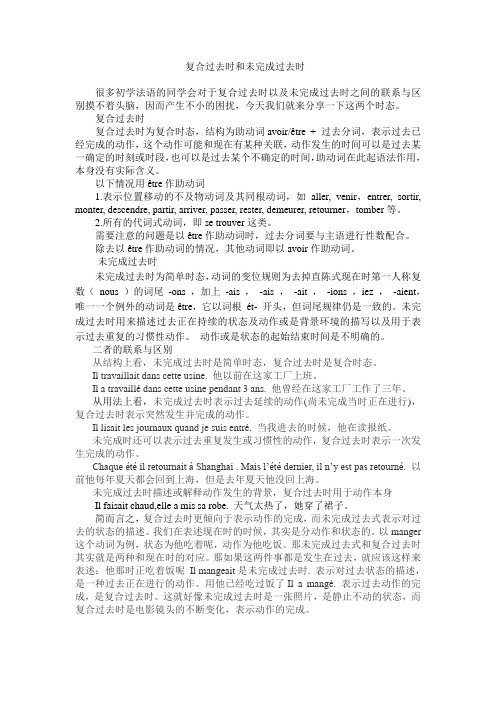
复合过去时和未完成过去时很多初学法语的同学会对于复合过去时以及未完成过去时之间的联系与区别摸不着头脑,因而产生不小的困扰,今天我们就来分享一下这两个时态。
复合过去时复合过去时为复合时态,结构为助动词avoir/être + 过去分词,表示过去已经完成的动作,这个动作可能和现在有某种关联,动作发生的时间可以是过去某一确定的时刻或时段,也可以是过去某个不确定的时间,助动词在此起语法作用,本身没有实际含义。
以下情况用être作助动词1.表示位置移动的不及物动词及其同根动词,如aller, venir,entrer, sortir, monter, descendre, partir, arriver, passer, rester, demeurer, retourner,tomber等。
2.所有的代词式动词,即se trouver这类。
需要注意的问题是以être作助动词时,过去分词要与主语进行性数配合。
除去以être作助动词的情况,其他动词即以avoir作助动词。
未完成过去时未完成过去时为简单时态,动词的变位规则为去掉直陈式现在时第一人称复数(nous )的词尾-ons ,加上-ais ,-ais ,-ait ,-ions ,iez ,-aient,唯一一个例外的动词是être,它以词根ét- 开头,但词尾规律仍是一致的。
未完成过去时用来描述过去正在持续的状态及动作或是背景环境的描写以及用于表示过去重复的习惯性动作。
动作或是状态的起始结束时间是不明确的。
二者的联系与区别从结构上看,未完成过去时是简单时态,复合过去时是复合时态。
Il travaillait dans cette usine. 他以前在这家工厂上班。
Il a travaillé dans cette usine pendant 3 ans. 他曾经在这家工厂工作了三年。
中考英语一轮语法复习简单句、并列句和复合句试题(共13页)
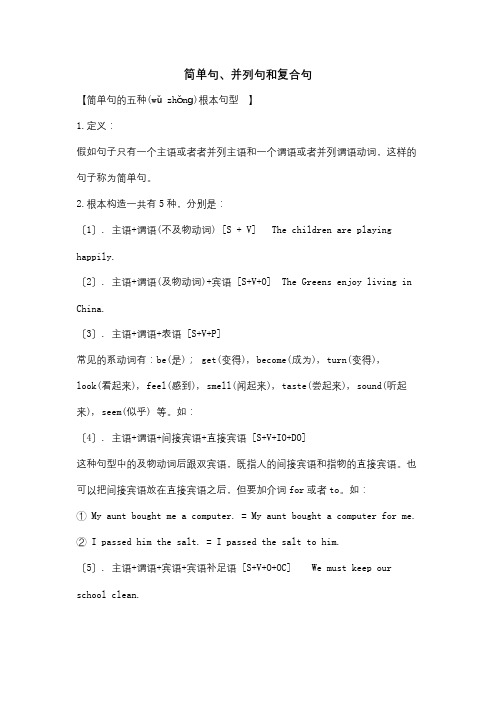
简单句、并列句和复合句【简单句的五种(wǔ zhǒnɡ)根本句型】1.定义:假如句子只有一个主语或者者并列主语和一个谓语或者并列谓语动词,这样的句子称为简单句。
2.根本构造一共有5种,分别是:〔1〕. 主语+谓语(不及物动词) [S + V] The children are playing happily.〔2〕. 主语+谓语(及物动词)+宾语 [S+V+O] The Greens enjoy living in China.〔3〕. 主语+谓语+表语 [S+V+P]常见的系动词有:be(是); get(变得), become(成为), turn(变得),look(看起来), feel(感到), smell(闻起来), taste(尝起来), sound(听起来), seem(似乎) 等。
如:〔4〕. 主语+谓语+间接宾语+直接宾语 [S+V+IO+DO]这种句型中的及物动词后跟双宾语,既指人的间接宾语和指物的直接宾语。
也可以把间接宾语放在直接宾语之后,但要加介词for或者to。
如:① My aunt bought me a computer. = My aunt bought a computer for me.② I passed him the salt. = I passed the salt to him.〔5〕. 主语+谓语+宾语+宾语补足语 [S+V+O+OC] We must keep our school clean.【感慨(gǎnkǎi)句】What +adj.+n.+主语+谓语!How+adj./adv.+ 主语+谓语!〔2021 〕1.Guan Dong saved an old lady out of the Yangtze River.________great courage he showedA. What aB. WhatC. How aD. How〔2021 〕2.- What________ programme is so attractive?- The guard of honor of the PLA are taking part in the parade on Red Square.-______ exciting eventA. How aB. What anC. How anD. what a【特殊疑问句】〔2021 〕1.---______ are you going to the School Uniform Exhibition, Army?---- To learn about different styles of school uniforms.A. WhatB. WhereC.WhyD. Which祈使句〔2021 〕Daniel, _______play with the mobile phone while you are walking in the street.A. don’tB. doesn’tC. won’tD.can’t并列句复习(fùxí)学案并列句是由两个或者两个以上的简单句连接而成。
复 合 过 去 时

2. courir(跑步;购物),parcourir(流经, 浏览) :couru
3. recevoir(=receive),décevoir(使…失 望),s’apercevoir(注意,觉察到) : reçu
4. voir,prévoir(预见到),revoir :vu 5. savoir(知道) :su 6. pouvoir :pu
apprises ? 我们一共学多少课了?
Combien de textes(阳复), nous avons appris ?
Quelles grammaires nous avons apprises ? 我们学了哪些语法了?
Nous avons appris quelles grammaires ?
Tu as sorti un conteau(刀)de ta porche. 你从口袋中掏出刀。
Je suis rentré(e) à l’université à 3h. 我 下午 3 点回来。
3. rire;sourire :ri
4. fuir;s’enfuir :fui(意思均为“逃跑”)
4. pp :u 1. tenir(=hold),retenir(=recite),ven
ir,revenir,devenir,prévenir(通知;~ qch. de qn.),obtenir(获得), sesouvinir(记得;~ + de qch. / qn.) :tenu
e :conclu
18. résoudre(resolve) :résolu 19. lire(读,看) :lu
20.vivre(生活) :vécu 5. pp :s 1. s’asseoir(坐下) :assis 2. prendre,apprendre,comprendre,sur
法语的过去时

复合过去时 le passécomposé
学习提要
1. 复合过去时表示事情的“结束、完成”或“结果”。 2.法语复合过去时的构成分为两种,第一种以 avoir 为助动词,第二种以 être 为助动词。 3. 要特别注意以être为助动词的复合过去时的配合问题。 4. 必须熟记过去分词的构成,尤其是不规则动词的过 去分词。 5. 以 avoir 为助动词的复合过去时要特别注意直接宾语 提前时的过去分词配合问题。 6. 代动词的复合过去时,要特别注意辨别自反代词在 句中的作用,若为直宾则过去分词需与其配合。
Le soir, Madame Dupont a fait ses devoirs et a appris ses leçons. A dix heures elle était fatiguée et elle est montée se coucher. Elle s’est déshabillée et s’est endormie aussitôt.
Elle s’est regardée dans la glace et il est descendu dans la salle àmanger. Elle s’est assise àtable et a pris son petit déjeuner. Elle est parti pour l’ école; en classe, Elle a bien travaillé. A quatre heures et demie elle est rentrée àla maison. Elle s’est promenée avec son chien. Ils ont jouéau ballon et se sont beaucoup amusés.
人教版新目标八年级上册 Unit1-Unit10单元语法练习期末复习题(答案不全)

Unit 1 Where did you go on vacation?复合不定式、过去式1.The children decided__________ their schoolyard this Friday afternoon.A.cleanB.to cleanC.cleaningD.cleaned2.--The meat is__________delicious.--Yes,but don’t eat_________.A.too much; too muchB.much too;too muchC.too many; many tooD.many too; many too3.I’m hungry. I want_________ to eat.A.anythingB.somethingC.everythingD.nothing4.--Do you have_______ to do?--No,I have________ to do.A.something;everythingB.nothing;somethingC.everything;anythingD.anything;nothing5.--Is there________ in today’s newspaper?----No,thing.A.anything importantB.something importantC.important anythingD.important something6.Why not ask_________ to help?A.everyoneB.someoneC.anyoneD.no one7.Everything__________ ready. We can start now.A.areB.beC.wereD.is8.Would you like________ to drink?A.somethingB.anythingC.everythingD.nothing9.--The cakes are quite delicious!Can I have one more?--Sorry,there is________ left. What about some biscuits?A.noneB.no oneC.nothingD.nobody10.--Where did your family________ last week?--We________ to the beach.A.go; goB.go; wentC.went; goD.went; went11.Jenny and I_________baseball the day before yesterday. She did better than me.A.playB.were playedC.playedD.are playing12.Mr.Black is out. But he________ here a few minutes ago.A.isB.areC.wasD.were13.--Why didn’t you buy any bread?--Sorry, I____________.A.forgetB.forgotC.rememberD.remembered14.The old man________ the young man_______ some delicious food.A.want;buyB.wanted;to buyC.wanted;boughtD.want to;to buy15.There is n_________ in the box. It’s empty.16.There is s____________ wrong with my bike,so I have to walk home.17.As I’m new here,I don’t know a___________here.(不定代词)18.I can’t find my pen a____________. DO you know where it is!(不定代词)19.Did you bring back a____________ from Shanghai?(不定代词)20.E__________ had a good time in the enjoyable party.(不定代词)Unit 2 How often do you exercise?频度副词1.--How’s Susan?--oh, I_______ see her because she lives abroad.A.alwaysB.oftenC.almostD.hardly2.--What’s wrong with you,Eric? You looked tired.-- I_________ to prepare for the final exam last night.A.picked upB.woke upC.stayed upD.put up3.Helen was so excited at the news that she could___________ say a word.A.everB.almostC.hardlyD.always4.Meimei listens to music__________.A.sometimesB.sometimeC.some timesD.some time5.I think eating more________ food can help you keep___________.A.health; healthB.health;healthyC.healthy;healthD.healthy;healthy6.Do you know the answer_______ the question?A.ofB.withC.forD.to7.I think it’s boring_______ computer games.A.playB.to playC.playingD.played8.--I hate vegetables. I_______ eat them.--But they are good for your health!You should eat them every day.A.alwaysB.seldomC.oftenually9.--Why do people there_______ use umbrellas in the sun?--Because they would rather enjoy the sunshine.A.hardly everB.oftenC.alwaysually10.--Where shall we eat tonight?--Let’s call Harry. He_______ knows the best places to go.A.onlyB.nearlyC.seldomD.always11.--Does your father love sports?--No. My father_____ goes to the gym with us although he dislikes sports.A.hardly everB.seldomC.sometimesD.never12.British people_______ wait in line whatever they do,even though there are only two people.A.alwaysB.seldomC.neverD.hardly13.Alicia________ speaks loud in front of others.--What a shy girl she is!A.everB.oftenC.alwaysD.never14.I________ ride a bike to school. But this morning,I walked to school.A.neverB.hardlyC.seldomually15.It______________ rains in the desert. It usually sunny and dry.(频率副词)16.He is only ten months old. He can____________ speak.(频率副词)17.My father___________ watches TV at night because he is busy with his work.(频率副词)18.The lazy boy__________ ever cleans his room.(频率副词)19.I live far from school,so I_______________ take a bus to school.(频率副词)20.Mr.Li is a fun teacher.His classes are_____________ interesting.(频率副词)Unit 3~Unit4形容词和副词的比较级和最高级1.This book is a little_________ than that one.A.cheapB.cheaperC.cheapperD.more cheap2.Gina likes to tell jokes.She always talks with others. She is very__________.A.seriousB.outgoingC.quiteD.shy3.I think Bob is the suitable person to take the job because he can do the work with___ money and __people.A.less; lessB.less; moreC.more; fewerD.less;fewer4.Lisa was still very weak when she left hospital. But after a week’s rest,she felt much______.A.goodB.betterC.badD.worst5.--Time is money.--But I think time is________ money.A.as importantB.more important asC.the most important inD.more important than6.Tom is good_______ Chinese and he is good________children.A.at;atB.with;withC.at;withD.with;at7.Bill and Graig are________boys,and Graig is_______ of the two.A.taller; tallestB.tall;tallerC.tall;the taller8.There will be______jobs for people because some robots will do the same jobs as people.A.manyB.moreC.fewerD.fewest9.--The relation between the two countries gets______. A war seems to break out soon.--I hope they will make peace with each other.A.worse and worseB.better and betterC.more and more beautiful10.--Many boy students think math is________ English.--I agree. I’m weak in English.A.much difficult thanB.so difficult asC.less difficult thanD.more difficult than11.Though the player is over thirty, he can still run______ some younger players.A.as fast asB.so fast asC.much fast thanD.more fast than12.--______ do you think of the football match?--It’s perfect. It’s more exciting than_____match that I have ever watched.A.How;any otherB.How;any othersC.What; any otherD.What; any others13.Staying with families and friends is one of_______ things in the world.A.the happiestB.happierC.the happyD.happiest14.My time in the middle school was one of_______ periods of my life.A.excitingB.more excitingC.the more excitingD.the most exciting15.--The scarves are all beautiful. I can’t decide which one to choose.--oh,look at this red one. I think it’s_________.A.beautifulB.more beautifulC.the most beautifulD.less beautiful16.C heng Daoming is one of the best___________(act) in China.17.T hese farmers are much_____________(friendly) than you think.18.W e can buy the used books___________(cheap)19.T his is the ______________(bad) thing I’ve ever done in my life.20.M ath is mot so________________(difficult) as you think.21.B oth my grandparents are eighty years old,but my grandma is______________(healthy).22.I think Sally did as______________(better) as Lucy in the math competition.23.T he DJs choose songs _________________(careful)of all the KTVs.24.T he______________(cheap) bags are not usually the worst ones.25.L isa’s parents have four daughters,and she is the______________(young) child.26.The boy was so____________(luck) that he lost both his money and his girlfriend.27.She hopes to be the_______________(win) of the competition.28.My house is very c________ to the school.Unit 5 Do you want to watch a game show?动词不定式作宾语1.Each of us was ready_______ those who were in trouble/A.for helpB.helpingC.to helpD.to helping2.I________ it our in this way,but I failed.A.tried to workB.tried workC.try to workD.try work3.She doesn’t mind_________ other people think of_________.A.how;sheB.how;herC.that;herD.what;her4.Sally plans______ after finishing her homework.A.to watch TVB.going shoppingC.to having breakfastD.drink coffee5.Try to sing more English songs,and you will find it interesting________ a foreign language.A.learnB.learnsC.learningD.to learn6.We want________ here for Chinese New Year.A.stayB.to stayC.stayedD.staying7.There are son many kinds of watches in the shop. We can’t decide__________.A.what to buyB.to buy whatC.which to buyD.to buy which8.They stopped________.but there was no sound.A.listenB.listeningC.to listenD.to listening9.The little boy hoped_______ anew toy form his father on his birthday.A.gettingB.getsC.to getD.got10.It’s necessary for us_______ to our parents when we have problems.A.to talkB.talkingC.talkD.told11.His mother often tells him_______ too much time planing games.A.not to spendB.don’t spendC.spendsD.spending12.My friend invited me______ the art club,and I accepted it with pleasure.A.joinB.to joinC.joinedD.joining13.We advise parents_______their children at home alone in order to keep them away from danger.A.nor leaveB.not to leaveC.leaveD.to leave14. I was angry with him for keeping me_______ to long.A.waitingB.to waitC.waitD.to waiting15.--What do you usually do in the morning?--I often practice_______English.A.speakB.to speakC.speakingD.spoke16.He promised________ his old friend during his stay in Tianjiang.A.seeB.seeingC.sawD.to see17.You can’t expect____________(learn) Japanese well in a few days.18.Gina wants_____________(visit) her grandparents this Sunday morning.19.I try__________(get) good grades in this Chinese exam.20.His daughter is learning____________(play) the piano.Unit 6~Unit7 将来时1.My uncle is going to________ Dalian next year.A.movesB.move toC.liveD.leaves for2.Finish your homework first,then you’ll_______watch TV for an hour.A.canB.be able toC.ableD.could3.There________ a basketball game in our school this evening.A.is going to haveB.will haveC.will isD.will be4.--Do you have any plans for tonight?--Yes,I______ at the new Italian restaurant in town.A.eatB.have eatenC.ateD.am going to eat5.Hurry up! The sky is covered with black clouds. I’m afraid it_______.A.rainsB.is going to rainC.rainedD.was raining6.My sister wants a new dress. She_______ it to the party tonight.A.wearsB.has wornC.woreD.is going to wear7.There_________ a dolphin show in the zoo tomorrow morning.A.wasB.is going to haveC.will haveD.is going to be8.The train________ at 10:00 a.m.A.will be arriveB.is arrivingC.is going to9.--why are you in such a hurry,John?--There______ a basketball match between Class Three and our class in two minutes.A.is going to beB.is going to haveC.will haveD.will hold10.The weather report says it________ rain in a week.A.will beB.is goingC.is going toD.are going to11.N o one knows what________________(happen) in 100 years.12.T here______________(be) a basketball match next Friday.13.We have no more vegetables in the fridge.I___________(go) and buy some.14.Traveling to space is no longer a dream. Russia_________(build) the first hotel in space in the near future.15.The kids may not go to school in the future.They___________ (study) at home on computers.16.If there is any change to the plan, I________ (tell)you as soon as possible.17.--I don’t know if Sam_________(come) tomorrow.-- I will tell you if he__________(come).18.R obots_____________(do) more heavy work for us int he future.19.There___________(be) a talk on education in our school tomorrow.20.Most of us don’t think their team_______________(win).21.I am afraid there____________(be) a meeting this afternoon. So I can’t join you.22.Kate_____________(will) a doctor in ten years.Unit 8 How do you make a banana milk shake?名词单复数1.--Why do you look so excited,Tim?--I’ve just got a wonderful___________.A.newsB.workC.jobD.furniture2.I paid 10yuan for__________ this morning.A.4 bottles milksB.4 bottles of milkC.4 bottles of milksD.4 milk3.Yesterday for dinner I had a piece of beef,vegetables and__________.A.some riceB.a few riceC.a little ricesD. a rice4.--What a good_________you’ve given me! Thanks a lot.--My pleasure.rmationB.newsC.suggestionD.advice5.Uncle Wang bought two_______ for me.A.breadB.dictionaryC.watchesD.photoes6.--How many________ are there in your school?--Twenty.A.woman teachersB.woman teacherC.women teacherD.women teachers7.I need some____________(蜂蜜) for my water.8.Don’t forgot to add some___________ to soup. It’s not salty enough.9.The___________(child) are playing games on the playground now.10.What do you like in your_____________(三明治)?11.Here are three p_________ of bread on the table.12.They usually eat____________(火鸡) on Thanksgiving Day.13.I need some______________(黄油)14.桌子上有酸奶和西瓜。
最新葡萄牙语语法:复合过去完成时
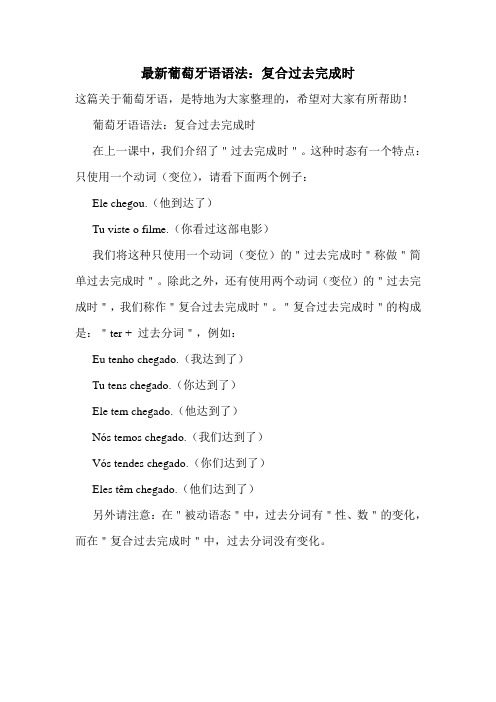
最新葡萄牙语语法:复合过去完成时
这篇关于葡萄牙语,是特地为大家整理的,希望对大家有所帮助!
葡萄牙语语法:复合过去完成时
在上一课中,我们介绍了"过去完成时"。
这种时态有一个特点:只使用一个动词(变位),请看下面两个例子:
Ele chegou.(他到达了)
Tu viste o filme.(你看过这部电影)
我们将这种只使用一个动词(变位)的"过去完成时"称做"简单过去完成时"。
除此之外,还有使用两个动词(变位)的"过去完成时",我们称作"复合过去完成时"。
"复合过去完成时"的构成是:"ter + 过去分词",例如:
Eu tenho chegado.(我达到了)
Tu tens chegado.(你达到了)
Ele tem chegado.(他达到了)
Nós temos chegado.(我们达到了)
Vós tendes chegado.(你们达到了)
Eles têm chegado.(他们达到了)
另外请注意:在"被动语态"中,过去分词有"性、数"的变化,而在"复合过去完成时"中,过去分词没有变化。
语法-复合过去时
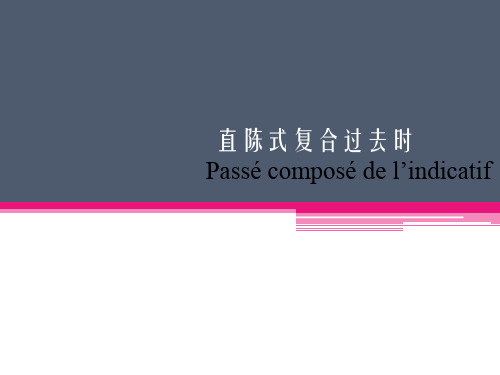
Qu’est-ce que tu as fait hier ? - J’ai regardé la télévision. - J’ai révisé mes leçons. - J'ai fait du sport.
Le présent
Passécomposé?
Le passécomposé
Qu’est-ce que tu fais? - Je vais au cinéma. - Je sors avec mes amis.
Байду номын сангаас
2.2. Passécomposé– 以être 作助动词
请注意: 在以être作为助动词的复合过去时中,过去分词有性数 变化,要与主语的性数相一致。
1. Elle est rentrée très tard cette nuit. 2. Monique et Marie sont déjàarrivées. 3. Nous sommes allés au cinéma.
attendu bu su vu
以u结尾
rire sentir accueillir
ri senti accueilli
以i结尾
1.1 Passécomposé– 过去分词的构成
不定式
mettre prendre apprendre
过去分词
mis pris appris
词尾种类
以is结尾
dire écrire faire
1.位移动词(不及物用法):(表示空间的移动/地点的变化) Aller, venir, arriver, entrer, rentrer, sortir, tomber, retourner, partir, descendre, monter, passer.
法语语法:法语时态总结

法语语法:法语时态总结时态总结下面是对法语时态的总结(和英语相对照)。
法语英语Present Tenses直陈式现在时(aimer): 一般现在时: 现在进行时:J’aime I love I am loving过去时未完成过去时: 一般过去时: 过去进行时:J’aimais I loved I was loving简单过去时: 一般过去时:J’aimai I loved完成时复合过去时: 现在完成时一般过去时:J’ai aimé I have loved I loved将来时简单将来时: 一般将来时(will + inf.)将来进行时:J’aimerai I will love I will be loving最近将来时(用aller): 一般将来时(going to + inf.):Je vais aimer I am going to love先将来时: 将来完成时: 将来完成进行时:J’aurai aimé I will have loved I will have been loving过去完成时先过去时: 过去完成时:J’eus aimé I had loved愈过去时: 过去完成时: 过去完成进行时:J’avais aimé I had loved I had been loving条件式条件式现在时: 现在条件式:J’aimerais I would love条件式过去时: 过去条件式:J’aurais aimé I would have loved虚拟式虚拟式现在时: 现在时虚拟语气:que j’aime that I love虚拟式未完成过去时: 过去时虚拟语气:que j’aimasse that I loved虚拟式过去时: 现在完成时虚拟语气 :que j’aie aimé that I would have loved虚拟式愈过去时: 过去完成时虚拟语气:que j’eusse aimé that I had loved时态的配合法语复合句中,时态的配合如下表;当主句动词是现在时或将来时,从句动词是:主句从句现在时现在时将来时现在时未完成过去时简单过去时复合过去时愈过去时复合过去时当主句动词是过去时,从句动词是:主句从句未完成过去时简单过去时未完成过去时先将来时未完成过去时复合过去时先过去时愈过去时。
【法语语法】时态-复合过去时VS未完成过去时
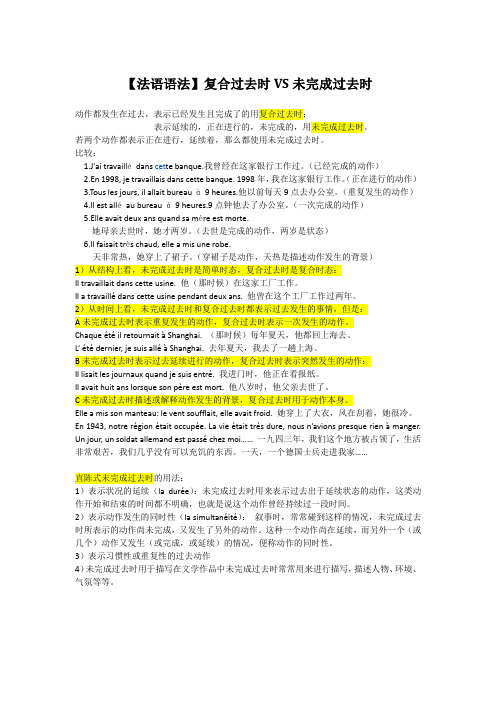
【法语语法】复合过去时VS未完成过去时动作都发生在过去,表示已经发生且完成了的用复合过去时;表示延续的,正在进行的,未完成的,用未完成过去时。
若两个动作都表示正在进行,延续着,那么都使用未完成过去时。
比较:1.J'ai travaillédans cet te banque.我曾经在这家银行工作过。
(已经完成的动作)2.En 1998, je travaillais dans cette banque. 1998年,我在这家银行工作。
(正在进行的动作)3.Tous les jours, il allait bureau à9 heures.他以前每天9点去办公室。
(重复发生的动作)4.Il est alléau bureau à9 heures.9点钟他去了办公室。
(一次完成的动作)5.Elle avait deux ans quand sa mère est morte.她母亲去世时,她才两岁。
(去世是完成的动作,两岁是状态)6.Il faisait très chaud, elle a mis une robe.天非常热,她穿上了裙子。
(穿裙子是动作,天热是描述动作发生的背景)1)从结构上看,未完成过去时是简单时态,复合过去时是复合时态:Il travaillait dans cette usine. 他(那时候)在这家工厂工作。
Il a travaillé dans cette usine pendant deux ans. 他曾在这个工厂工作过两年。
2)从时间上看,未完成过去时和复合过去时都表示过去发生的事情,但是:A未完成过去时表示重复发生的动作,复合过去时表示一次发生的动作。
Chaque été il retournait à Shanghai. (那时候)每年夏天,他都回上海去。
法语语法:复合过去时和未完成过去时Passé-composé-et-imparfait

3. 用法和位置: Ex: J’ai mangé du poisson à midi. As-tu pris le petit-déjeuner ? Elle n’a pas fait de sport.
2)bien, aussi, toujours, trop, beaucoup, rien, pas, jamais 等副 词放在助动词和过去分词之间(但是personne 放在最后) Vous avez beaucoup travaillé. Je n’ai rien vu. Je n’ai pas mangé. Elle n’a vu personne.
• 注意:配合的情况。
Attention : 如果代词式动词的代词是直接宾语,pp 要配合,如果代 词是间接宾语,则 pp 不用配合。
Ex : Elle s'est lavée. Elle s’est lavé les mains.
Elle s'est lavée dans la salle de bains. Elle s'est lavé les mains.
Passé composé et imparfait
Le passé composé
• 助动词 ( avoir, être)+过去分词
I.所有及物动词以及大部分不及物动词均由avoir做助动词
1. 构成:
• 第一组规则动词+aller:去掉词尾的er, 变成é Ex: chanter-chanté, danser-dansé, aller-allé
• II.少数不及物动词以être做助动词
1. 构成:naître ( né,e), mourir (mort,e), aller( allé,e), partir ( parti,e), sortir (sorti,e), arriver( arrivé,e), retourner(retourné,e), venir ( venu,e), revenir (revenu,e), rentrer( rentré,e), entrer(entré,e), rester(resté,e), devenir( devenu,e), tomber(tombé,e), monter(monté,e), descendre (descendu,e)
英语语法 什么是动词的复合形式

英语语法什么是动词的复合形式在英语语法中,动词的复合形式(compound forms)是由一个助动词(auxiliary verb)和一个主要动词(main verb)组成的动词结构。
这种结构的形式可以是时态、语态、情态动词和完成时等。
下面将详细介绍动词的不同复合形式。
1. 时态复合形式:a. 现在进行时:由助动词"be"和主要动词的现在分词形式构成,表示现在正在进行的动作。
- She is studying for her exam.(她正在为考试而学习。
)- They are playing soccer in the park.(他们正在公园里踢足球。
)b. 过去进行时:由助动词"be"的过去式和主要动词的现在分词形式构成,表示过去某个时间点正在进行的动作。
- He was reading a book when I called him.(当我给他打电话时,他正在看书。
)- We were watching a movie last night.(昨晚我们正在看电影。
)c. 现在完成时:由助动词"have"和主要动词的过去分词形式构成,表示过去发生的动作对现在的影响或结果。
- I have finished my homework.(我已经完成了我的作业。
)- They have traveled to many countries.(他们已经去过很多国家。
)2. 语态复合形式:a. 被动语态:由助动词"be"的不同时态形式和主要动词的过去分词形式构成,表示动作的接受者或受事者。
- The letter was written by John.(这封信是约翰写的。
)- The book will be published next month.(这本书将在下个月出版。
)3. 情态动词复合形式:a. 情态动词+动词原形:由情态动词和动词的原形构成,表示能力、许可、可能性等。
Unit 1 重点语法grammar复合不定代词和一般过去时(人教版)

班级姓名学号分数Unit 1 Where did you go on vacation?语法复合不定代词和一般过去时(时间:60分钟,满分:100分)一、单项选择(本大题共50小题,每小题1分,共50分)1.—Life is the most important.—I think so. ________ is more important than life.A.Something B.Anything C.Nothing D.Everything 2.The school concert was so amazing that ________ left in the middle of it.A.everybody B.anybody C.nobody D.somebody3.Our school is going to have a sports meeting tomorrow. ________ is ready now. A.Something B.Everything C.Anything D.Nothing 4.—Does _______ else want to come?—No, no one wants to come.A.anyone B.someone C.anything D.something 5.There is ________ wrong with my computer. It doesn’t work now.A.something B.anything C.everything6.—Hey, Bruce! _______ is waiting for you at the school gate.—Oh, maybe it is my brother.A.Someone B.Anyone C.Everyone7.A bus hit a tree this morning. Luckily, ________ was hurt.A.somebody B.anybody C.everybody D.nobody8.—I didn’t eat ________ this morning. I’m hungry.—There are ________ cookies in my bag. Would you like ________?A.anything; some; some B.anything; some; any C.something; any; some 9.—Where did you go? I visited you, but ________ was in.—I went fishing with my friends all afternoon.A.nobody B.somebody C.everybody D.anybody 10.—Excuse me, is there ________ important in today’s newspaper?—Let me see. Oh, China sent its Tianhe Space Station Core Module (核心舱) on April 29th, 2021. A.anything B.something C.everything D.nothing11.There isn’t ________ interesting in the newspaper.A.something B.anything C.nothing D.everything 12.—Have you brought the book we need now?—Sorry, I was in such a hurry that I didn’t bring _________ with me.A.anything B.something C.nothing D.everything 13.I’d love to visit ________.A.anywhere warm B.warm anywhereC.somewhere warm D.warm somewhere14.I’d like to go ________.A.to somewhere peaceful B.to peaceful somewhere C.somewhere peaceful D.peaceful somewhere15.Almost ________ in our group visited the history museum last weekend.A.anyone B.everyone C.someone16.I’ve waited for a long time. I hope not to have ________ to do.A.something boring B.anything boring C.something bored 17.There isn’t ________ interesting or surprising in the newspaper today.A.something B.everything C.anything D.nothing 18.—Are you free tomorrow? Let’s go skating.—All right. I have ________ to do.A.nothing B.something C.anything D.everything 19.—What do you think of My Country, My Parents?—Wonderful. But I don’t think _________ will like it.A.somebody B.anybody C.everybody D.nobody 20.— Tom, there’s ________ on TV. Let’s play chess.— Sounds good.A.anything interesting B.interesting anything C.nothing interesting D.interesting nothing 21.—Sam, today is Mother’s Day.—Let’s buy ______ for our mother after school.A.something special B.anything specialC.special something D.special anything22.— Doctor, what’s wrong with my mom?— Don’t worry. It is ________ serious. It’s only a cold.A.nothing B.something C.anything D.everything 23.—I find more and more people begin to exercise to keep healthy these days.—Yeah. ________ is more important than our health.A.Something B.Anything C.Nothing D.Everything 24.—Will you buy ________ on your vacation, Mary?—Yes, I am going to buy some beautiful paintings for my mother.A.something special B.special somethingC.anything special D.special anything25.—Is there ________ in the classroom?—No, I can see ________ there.A.anybody; somebody B.somebody; anybody C.nobody; anybody D.anybody; nobody 26.I don’t feel very well today. I don’t want to have ________.A.something B.nothing C.anything D.some27.—Did you meet ________?—Yes. I met some very interesting people.A.someone interesting B.anyone interesting C.interesting someone D.interesting anyone 28.I am hungry now. I want ________ to eat.A.something nice B.nice something C.something bad29.I couldn’t find ________ in the English newspaper. So I took down some new words instead. A.something interesting B.anything interestingC.interesting something D.interesting anything30.Lucy is really kind and friendly. ________ in the class likes her.A.Someone B.Anyone C.Everyone D.No one31.The old woman hid the box in such a safe place that she believed ________ would find it. A.anybody B.nobody C.somebody D.everybody 32.Sorry for being late. ________urgent happened on my way here.A.something B.nothing C.anything D.everything 33.—Laura, ________ called you just now when you were out.—Thank you. It must be my mom.A.nobody B.anybody C.everybody D.somebody 34.—Don’t smoke here.Look at the sign!—Sorry, I ________ see that.A.don’t B.won’t C.didn’t D.haven’t 35.—I have seen the fashion show on TV with my cousin at home.—When _________ you _________ it?A.will; see B.have; seen C.did; see D.do; see 36.I ________ shy. Doing projects with others has helped me become outgoing. A.was used to be B.was used to being C.used to be D.used to 37.—When ________ your father ________ this car?—About half a year ago.A.has; bought B.have; bought C.will; buy D.did; buy 38.I’m sorry you’ve missed the train. It ________ five minutes ago.A.will leave B.has left C.left D.leaves 39.Why are you so late? The parade ________ twenty minutes ago.A.has begun B.has been C.began D.has been on 40.It only ________ me half an hour ________ to school every day last term. A.takes; to ride B.spent; to ride C.cost; walk D.took; to walk 41.I ________ that new movie with my friends last month. It’s amazing.A.watch B.watched C.watches D.have watched 42.I was busy last night. I ________ a model plane with my father.A.make B.made C.am making D.have made 43.Not long ago, he ________ a birthday present for his mother.A.has bought B.bought C.buys D.will buy 44.We ________ two hours on the trip to the park. It was too ________.A.spend; bored B.take; boring C.spent; boring D.took; bored 45.The town ________ a lot of pollution in the past but it is not a problem any more. A.has B.is having C.will have D.had 46.—Could I use your dictionary, Tom? Mine is at home.—Sorry. I ________ it to my cousin yesterday.A.lend B.lent C.borrow D.borrowed 47.—I ________ a traffic accident yesterday. Many passengers were hurt.—That’s terrible!A.saw B.watched C.looked D.see 48.My father used to __________ to work, but now he is used to __________ to work.A.drive; walk B.driving; walkC.driving; walking D.drive; walking49.Mary ________ down on the ground and soon fell ________.A.lied; asleep B.lay; sleep C.laid; sleeping D.lay; asleep 50.Shanghai Disneyland has attracted millions of people since it ________ in 2016.A.opens B.is open C.opened D.has opened二、用所给单词的正确形式填空(本大题共15小题,每小题2分,共30分)51.My father ________(drive)me to school, but now I take the underground all by myself. 52.There _________ (be) clean and fresh air here several years ago.53.The Women’s World Cup ________(not begin)until 1991 when China hosted it in Guangzhou. 54.He ________(write)the famous novel when he was sixty years old.55.He said that he _________(begin)to learn French when he was only six years old.56.The old man put on his hat and then ________ (leave) the office.57.My sister received the offer, but she ________ (refuse).58.—Who ________ (throw) the waste here?—The workers of that factory did.59.My mother ________ (pay) 55 yuan for the meat yesterday.60.This dictionary _________ (cost) me 10 yuan.61.My car _______ (break) down on the way, so I had to call 122 for help.62.The minute I ______ (sit) down in front of the TV, my mom came over.63.He _________ (live) in Wuxi two years ago.64.Larry with his friends_______(visit) museums last month.65.Last Christmas, I ________ (hide) a gift from my son, but he found it out easily.三、句型转换(本大题共10小题,每小题2分,共20分)66.I felt disappointed at the result.(对划线部分提问)__________________ you feel at the result?67.My sister read an interesting story book in the library. (对划线部分提问)________ ________ your sister read in the library?68.This problem is so difficult that nobody can work it out.(同义句转换)This problem is ________ difficult for ________ to work out.69.He didn’t accept to take part in this activity. (改为同义句)He ________ ________ take part in this activity.70.We spent the whole day visiting Hong Kong Disneyland. (改为同义句) It _________ _________ the whole day to visit Hong Kong Disneyland. 71.I bought something in the shopping center (改为一般疑问句)________you________________in the shopping center?72.She met someone interesting at the party. (改为否定句)She ______ ______ ______ interesting at the party.73.Everyone wants to talk to him.(改为否定句)________ ________ ________ to talk to him.74.Walt Disney created Disneyland in the USA.(改为一般疑问句)________ Walt Disney ________ Disneyland in the USA?75.The clerk led the boy to the reception desk(改为否定句)The clerk ________ ________ the boy to the reception desk.参考答案:1.C【解析】句意:——生命是最重要的。
法语语法--复合过去分词

1.1.构成: ayant + 过去分词 ayant fait étant + 过去分词 étant arrivé s’étant levé 2.2.⽤法: 与英语中现在分词的完成式基本相同,表⽰⼀个主句谓语之前完成的动作,起状语作⽤,表⽰时间、原因等。
Ayant fini (having finished)son travail, il est allé au concert avec sa famille . S’étant réveillée (having waked) très tôt, Sophie put partier à 7 heures. N’ayant pas reçu (not having received) d’argent, je lui ai écrit de nouveau. Etant 在复合过去分词中常可省略: (Etant) retourné à la station de métro, M. Dubois retrouva son parpapluie. 复合过去分词的被动形式为:ayant été + 过去分词:ayant été 亦常省略。
(Ayant été) grondée par son oncle, Marie ne veut plus rester à la ferme. II替代其他连词的que Quand, lorsque, comme, si, puisque, parce que, dès que, pour que, bien que 等引导⼏个并列的状语从句时,可以⽤连词que替代重复出现的上述连词或连词短语。
【人教】英语 八上-U 1-语法-复合不定代词+动词过去式

1. Oh,did you go ___a_n_y_w_h_e_r_e____ interesting? 2. Did you do ___a_n_y_th_i_n_g_____ special last month? 3. Did ____e_v_e_r_y_o_n_e___ have a good time? 4. Did you go with ___a_n_y_o_n_e______ ? 5.___E_v_e_r_y_o_n_e____ was on vacation.
强化练习:根据句意选词(可以重复使用)
something nothing anytherything anywhere anyone
6. I bought _s_o_m_e_t_h_in_g__ for my father, but _n_o_th_i_n_g__ for my myself 7. ___E_v_e_ry_t_h_in_g___ tasted really good! 8. Still___n_o__o_n_e______ seemed to be bored. 9. Could you give me __s_o_m__e_th_i_n_g____ to eat? 10. The only problem was that there was __n_o_t_h_in_g___ much to do
Where did you go on vacation?
单元语法
一. 复合不定代词 二 .由where-构成的疑问副词 三.一般过去时
一. 复合不定代词
1.不定代词:不指替任何特定名词或形容词的代词。 2. 复合不定代词组成:
由 some、any、 no、every 加上-one、-body、 -thing ①. someone, somebody, something ②. anyone, anybody, anything, ③. nothing, nobody, no one, ④. everything, everybody, everyone,
- 1、下载文档前请自行甄别文档内容的完整性,平台不提供额外的编辑、内容补充、找答案等附加服务。
- 2、"仅部分预览"的文档,不可在线预览部分如存在完整性等问题,可反馈申请退款(可完整预览的文档不适用该条件!)。
- 3、如文档侵犯您的权益,请联系客服反馈,我们会尽快为您处理(人工客服工作时间:9:00-18:30)。
语法复习题一:时态之复合过去时姓名____________I.Le passé composé :A.Le participe passé :1.Participes en « é » : Tous les verbes en « -er »2.Participes en « u » :A voir,__eu_______ l ire,____lu______ voir,___vu______ boire,___bu______Entendre,___entendu_ attendre,_attendu___ répondre,_répondu_ perdre,_perdu__V ouloir,_voulu___ devoir,_dû________ pouvoir,__pu______ savoir,__su____Croire,__cru________ falloir,__fallu________Connaître,_connu_____ disparaître,_disparu____ p laire,___plu_________ pleuvoir,_plu________Recevoir,_reçu_______ venir,__venu__ vivre,__vécu__________3.Participes en « i » :Finir,_fini_______ grandir,_grandi_______ choisir,__choisi_______Prendre,_pris___ appendre,_appris_____ comprendre,_compris___ mettre,_mis__________ Dire,_dit_______ écrire,_écrit_________ conduire,_conduit______autres cas :souffrir,_souffert______ ouvrir,_ouvert_______ découvrir,_découvert____ offrir,__offert______peindre,_peint________ craindre,_craint_______ faire,_fait____________3. Les verbes du type « arriver » / « partir » s’utilisent avec « être » :V enir, _venu_________ aller,__allé_______ entrer,_entré________ sortir,__sorti_______Arriver,_arrivé________ rester,_resté______ partir,__parti________ tomber,_tombé_____Monter,_monté_______ descendre,_descendu___naître,__né_________ mourir,_mort_______Retourner,_retourné____ passer,_passé_______B.Mettez les phrases suivants au passé composé :Je mange un croissant et je bois un café.J’ai mangé un croissant et j’ai bu un café.1.Georges achète le journal et il prend l’autobus.Gréorge a acheté le journal et il a pris l’autobus.2.Maria met un imperméable et elle prend un parapluie.Maria a mis un imperméable et elle a pris un parapluie.3.V ous lisez le journal et vous voyez une annonce intéressante.V ous avez lu le journal et vous avez vu une annonce intéressante.4.Nous perdons nos clés et nous devons appeler les pompiers.Nous avons perdu nos clés et nous avons dû appeler les pompiers.5.Je prends des vacances et je repeins mon appartement.J’ai pris des vacances et j’ai repeint mon appartement.C.Répondez aux questions selon le modèle.V ous êtes venu à l’école en métro hier ? Oui, hier je suis venu à l’école en métro.1.V ous êtes venu en taxi, la première fois ?Oui, je suis venu,e en taxi la première fois.2.V ous êtes allé à l’hôtel à pied hier soir ?Oui, je suis allé,e à l’hôtel à peid hier soir.3.V ous êtes passé devant la Concorde ?Oui, je suis passé,e devant la Concorde.4.V ous êtes arrivé avant six heures ?Oui, je suis arrivé,e avant six heures.5.V ous êtes ressorti plus tard ?Oui, je suis ressorti,e plus tard.D.Répondez aux questions selon le modèle.V ous vous êtes reposé, dimanche dernier ? Oui, je me suis reposé, dimanche dernier.1.V ous vous êtes promené dans le jardin du luxembourg ?Oui, je me suis promené,e dans le jardin du luxembourg.2.V ous vous êtes assis sur les bancs de la place Furstenberg ?Oui, je me suis assis,e sur les bancs.3.V ous vous êtes arrêté devant la fontaine Saint-Michel ?Oui, je me suis arrêté,e devant la fontaine Saint-Michel.4.V ous vous êtes perdu pour rentrez chez vous ?Oui, je me suis perdu,e pour rentrer chez moi.5.V ous vous êtes couché très tôt ?Oui, je me suis couché,e très tôt.E.Mettez au passé composé en utilisant les pronominaux réciproques, selon le modèle.Quand avez-vous connu vos amis espagnols ? (1990, Barcelone)Nous nous sommes connus en 1990 à Barcelone.1.Où avez-vous rencontré votre femme ? (plage de Saint-Tropez, hiver)Nous nous sommes rencontés sur la plage de Saint-Tropez en hiver.2.Où vous êtes-vous mariés ? (la mairie, printemps)Nous nous sommes mariés à la mairie au printemps.3.Quand avez-vous connu Arthur ? (1975, concert des Stones)Nous nous sommes connus en 1975 au concert des Stones.4.Quand vous êtes-vous revus depuis ? (concert de Khaled, Marseille)Nous nous sommes revus au concert de Khaled à Marseille.F.Faites des phrases selon le modèle.En général, je bois une tisane le soir, mais hier soir, j’ai bu un double whisky.1.Chaque semaine, je reçois une ou deux cartes postales, mais la semaine dernière, _j’aireçu____________huit lettres.2.D’habitude, je bois deux cafés par jour, pas plus, mais hier, _j’ai bu_____________ au moins cinqcafés.3.En général, je lis un roman par mois, mais le mois dernier, _j’ai lu_____________ trois romans.*4.L e matin, j’attends le bus cinq minutes maximum, mais hier matin, _j’ai attendu___________plusde trente minutes.5.En général, je perds trois parapluies par hiver, mais l’hiver dernier, _j’ai perdu____________aumoins dix parapluies.G.Mettez au passé composé.Ouvrir une lettre et avoir un choc. J’ai ouvert_une lettre et j’ai eu un choc.Boire de l’alcool et avoir mal à la tête.J’ai bu de l’alcool et j’ai eu mal à la tête.Prendre sa voiture et conduire dans la nuit. J’ai pris ma voiture et j’ai conduit dans la nuit.Brûler un feu rouge et être arrêté par la police. J’ai brûlé un feu rouge et j’ai été arrêté par la police.Plaire au gendarme et payer une légère amende. J’ai plu au gendarme et j’ai payé une légère amende.H.Racontez les événements de la jo urnée d’hier, selon le modèle.Un avion arrive à Orly. Un avion est arrivé à Orly.1. Un bébé naît dans une maternité. Un bébé est né dans une maternité.2. Jean arrive des Etats-Unis. Jean est arrivé des Etats-Unis.3. Des enfants vont au bord de la mer. Des enfants sont allés au bord de la mer.4. Deux voleurs entrent dans un appartement. Deux voleurs sont entrés dans un appartement.5. Un homme d’Etat meurt dans son lit.Un homme d’état est mort dans son lit.6. Un homme tombe amoureux. Un homme est tombé amoureux.plétez l’exercices avec les verbes manquants.Hier soir, j’ai mis un gros pull, j’ai pris mon parapluie et j’_ai pris_________ l’autobus pour aller au cinéma. Dans une épicerie, j’_ai acheté__________ un paquet de biscuit s et une bouteille de Coca. J’_ai bu_______ le Coca en marchant et j’_ai mangé_____________ les biscuits dans la queue du cinéma. J’__ai passé___________dix minutes pour dîner et j’_ai dépensé_____________ quinze francs. Dans la même soirée, j’__ai vu______________ deux films : un film anglais et un film polonais. A minuit, j’_ai pris _______________ un taxi. Finalement, j’_ai passé_____________une bonne soirée, pas très chère.-- Bonjour, Madame Delmer ! V ous êtes arrivée de Londres aujourd’hui ?-- Oh non ! Je__suis arrivé______________il y a déjà huit jours, mais je__suis allé_____d’abord chez ma fill e, à la campagne. J’ai été_____________chez elle tout le week-end, puis__je suis allé____voir une amie en Bretagne et finalement, ce matin, je__suis renté______________chez moi, à Paris.-- V ous n’êtes pas fatiguée de tous ces voyages ? Comment __êtes-vous revenu____________________ de Bretagne, en train ?-- Oui, cette fois-ci, je __susi rentré_______________ e n train. La dernière fois, j’ai été ______________bloquée deux heures dans les embouteillages aux portes de Paris et je __suis arrivé________________très tard au bureau. Maitenant je ne prends plus que les transports publics.J.Faites des phrases selon le modèle.Participer à une manifestation de rue : 32 %Trente-deux pour cent des Français ont participé à une manifestation de rue.1.Prendre des médicaments pour dormir : 30%Trente pour cent des Français prennent des médicaments pour dormir.2.Gagner à un jeu national : 21%Vingt et un pour cent des Français gagne à un jeu national.3.Consulter une voyante: 15%Quinze pour cent des Français consultent une voyante.plétez avec « être » ou « avoir » et la forme pronominale si nécessaire.Hier matin, Paula __s’est ___________ levée très tôt ; elle _est________ descendu les escaliers en vitesse. Elle __est_________ arrêtée au bar pour prendre un café. Quand elle _a________ sorti son portefeuille pour payer, une photo __est_______ tombée par terre. Un garçon brun_a_______ ramassé la photo. Il _a_______regardéPaula et il __a_____souri. Ils ___ont______ commencéàbavarder er ils _____ont______ passétoute la matinée ensemble. Paula _a___________ tout oubliéce jour-là, c’est à dix heures du soir qu’elle s’est souvenue de son rendez-vous chez le dentiste.L.Mettez les accords manquants.Hier soir, ma soeur est allée au cinéma et elle a amené___ ma nièce avec elle. Elles sont rentrées___ à huit heures pour dîner, mais elles ont continué___ à parler du film toute la soirée. Ensuite, elles ont découpé_____ des images dans les magasines et elle se sont amusées____ àles coller dans un cahier. Elle se sont endormies_____ très tard et ce matin, elles se sont levées____ avec difficulté : elles sont restées____ au lit jusqu’à dix heures et demie. Elles se sont rendormi es____ après le déjeuner et àcinq heures, elles sont sorties_____ pour aller voir un autre film.M.Posez les questions et répondez selon le modèle :Téléphoner à Pierre – Aller en Bourgogne – V isiter quelques musées – Boire du vin rouge – Dormir dans la région – Parler aux soldats – Retourner dans la régionV ous avez téléphoné à Pierre ? Oui, je lui ai téléphoné.V ous êtes allé,e en Bourgogne ? Oui, j’y suis allé,e.V ous avez visité quelques musées ? Oui, j’en ai visité.V ous avez bu du vin rouge ? Oui, j’en ai bu.V ous avez dormi dans la région ? Oui, j’y ai dormi.V ous avez parlé aux soldats ? Oui, je leur ai parlé.V ous êtes retourné dans la région ? Oui, j’y suis retourné.N.Répondez en utilisant l’adverbe.Le chiffre d’affaires de la société a augmenté ? (beaucoup)Oui, il a beaucoup augmenté. situation générale s’est améliorée ? (bien)Oui, elle s’est bien améliorée.2.Le personel s’est inve sti dans ce projet ? (beaucoup)Oui, il s’est beaucoup in vesti dans ce projet.3.Le directeur a soutenu ses employés ? (toujours)Oui, il a toujours soutenu ses employés.4.Ton fils a mangé ? (trop)Oui, mon fils a trop mangé.O.Répondez aux questions à la forme négative.A vez-vous déjeuné. Non, je n’ai pas déjeuné.1.Etes-vous allé au cinéma hier soir ?Non je n’y suis pas allé,e hier soir.2.A vez-vous reconnu Françoise ?Non je ne l’ai pas reconu.3.Etes-vous monté sur la tour Montparnasse ?Non, je n’y suis pas monté.4.A vez-vous dîné au restaurant samedi dernier ?Non, je n’y ai pas dîné samedi dernier.5.A vez-vous fait des exercices, ce matin ?Non je n’en ai pas fait ce matin.P.Posez la question selon le modèle.Où êtes-vous allés pour les vacances ? Nous sommes allés en Russie.1._Pendant combien de temps êtes-vous restés ? Nous sommes restés deux semaines.2._Où êtes-vous allés ? Nous sommes allés à l’hôtel.3._Qu’avez-vous visité ?_ Nous avons visité Paris, Marseille et Lille.4._Quand êtes-vous partis ? Nous sommes paris le quinze juillet.5._Combien de francs avez-vous payés ?__ Nous avons payé en tout cinq mille francs.。
